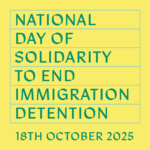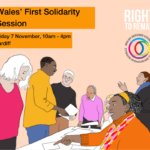
This blog was updated on 7 December 2023 to include information about applying for Universal Credit without a Biometric Residence Permit (BRP). It was updated again on 8 January 2024 to reflect the change to when the 28-day notice period begins.
There has been a significant increase in the number of evictions from Home Office asylum accommodation for those who have refugee status since August 2023.
This is difficult in itself, but what has made it harder is the very short notice people receive. In reality people were getting as little as a week or even 4 days’ notice from the Home Office to find somewhere new to live. This has since increased to 28 days – keep reading to find out more.
This blog will explain what is happening, why it is happening, and some steps that can be taken to improve your situation or at least respond to a notice of eviction.
If you would like to learn more about asylum support and accommodation, you can read our detailed Toolkit page.
To learn more about this topic, do take a look at the incredible work of the Asylum Support Appeals Project, and this blog by Free Movement. This article draws on information provided by both organisations.
What is happening?
Thousands of people in Home Office hotel accommodation have been pushed into or are at risk of experiencing homelessness because of a subtle shift in how the Home Office has been applying its own policy in the last few months. This is very worrying.
Since August 2023, people with refugee status (this means their asylum claim has been accepted by the Home Office) have been receiving ‘Notices to Quit’ their hotel asylum accommodation within very short periods of time – sometimes even as little as a matter of days. A Notice to Quit is a letter from the Home Office that states that the person has finished their time in the asylum accommodation and will need to find somewhere new to live within a certain period of time.
As a result of an increase in levels of homelessness, in December 2023, the Home Office stated that this very short notice period was only meant for the month of August, and that it would revert back to a 28-day notice period. This means that people who receive refugee status now have 28 days from when they receive their Biometric Residence Permit (BRP) card, not 28 days from when their asylum claim is accepted.
When you receive refugee status, this comes with many new changes, and these changes can be overwhelming. For example:
- When someone is given a short window of time to move out of hotel accommodation (somewhere they may have lived for a long time), it means that they do not have the chance to make a homelessness application in time to the local authority. This means that they could face homelessness for days or even weeks before the local authority can place them in a new property.
- This is also a big issue because local authorities will not usually accept a homelessness application unless there is proof that the person has been evicted. So, refugees cannot pre-empt (take action earlier) this issue because they need to wait until they receive the Notice to Quit letter before they can make a homelessness application.
- When someone is given a very short window of time until their asylum allowance is stopped, they can be left destitute and without any money because applications for Universal Credit (a type of benefit) take about 5 weeks to process.
- Another issue is that while councils have an obligation to provide emergency accommodation to families with children, adults who do not have children may not be eligible for that support and are at risk of finding themselves homeless.
For an outline of how the eviction process should happen, including a step-by-step guide to the documents people should be receiving, read this Free Movement blog.
To learn more about what happens after you receive refugee status, you can read our Legal Update blog.
Why is this happening?
This is all happening because the Home Office is now applying its own policy about asylum support very strictly. So, it is not exactly a new policy, but instead the Home Office is interpreting things more strictly and did not provide a warning that it would be doing so.
Generally, if a person had section 95 support while they were waiting for an asylum decision, they remain entitled to it for 28 days after they receive a grant of refugee status, or for 21 days if their asylum claim is refused by the Home Office.
Until August 2023, the Home Office was not applying this policy very strictly and so many people who received refugee status were able to stay in hotels for longer than the 21/28 day period.
From August, the Home Office was applying this policy to people who receive(d) refugee status, who were then officially given a minimum of 7 days’ notice to move on from the accommodation (though we have heard of several instances where people were given only 4 days’ notice in practice).
The Home Office is also applied this to asylum allowance (weekly allowance) too. Access to asylum accommodation and financial support will end on the same day. This applies to section 95 and section 4 support.
This is an extremely difficult situation for people to be in, and is an extension of the Hostile Environment: even when people have obtained status and the Home Office has accepted their claim, they are not eased into society but rather placed at risk of homelessness.
Remember, since December 2023, the Home Office stated that this very short notice period was only meant for the month of August, and that it would revert back to a 28-day notice period. This means that people who receive refugee status now have 28 days from when they receive their Biometric Residence Permit (BRP) card, not 28 days from when their asylum claim is accepted.
Although we wish we could do more, below are a number of steps that people can take to (slightly) improve their situation or at least address it.
What can be done about it?
These are suggestions for potential steps you can take to resolve the issue of eviction from hotel accommodation.
- Ask for an extension of asylum support. You can do this if you have received a grant of refugee status. You can do this by contacting Migrant Help.
- Claim Universal Credit (benefits). The Department for Work and Pensions has said that people with refugee status can apply for Universal Credit using their Application Registration Card (ARC card) and their Home Office Decision Grant Letter as forms of identification if they have not yet received their Biometric Residence Card (BRP). The ARC card and decision letter must be presented together to be accepted as a valid form of identification. You can read more about how to claim for Universal Credit here.
- Appeal the Home Office’s decision to refuse asylum. If you have received a refusal of your asylum claim, you can appeal the decision (whether or not you have a lawyer). In order to appeal, a person needs a copy of their discontinuation letter. If you have not received a decision letter, you can request it from Migrant Help on CopySupportDecisions@migranthelpuk.org. To learn about how to appeal, read our detailed Toolkit page on Preparing for an Appeal here. People who appeal their asylum refusal are still considered to be ‘in the system’ and are typically entitled to section 95 support.
- Appeal to the Asylum Support Tribunal. There may be grounds for an appeal on the revocation (this means the ending) of your asylum support. To find out more about asylum appeals, browse the resources on the Asylum Support Appeals Project’s website here. If you are a second-tier advice giver, you can contact their advice line on 020 3716 0283 on Mondays, Wednesdays and Fridays between 2pm–4pm.
- If you work with/support people who are experiencing this issue, please do keep track of this information and share it with your community, as well as what steps you are taking to address the issue and support those affected. Knowledge sharing is power. Now more than ever, our radical solidarity is essential.
Again, to learn more about this topic, do follow the work of the Asylum Support Appeals Project, and read this blog by Free Movement.













Discussion: